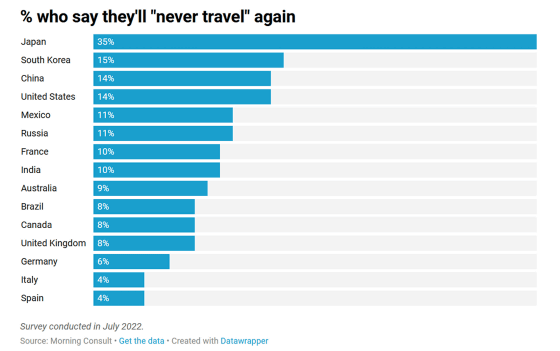Overseas media report that ``Japanese people are moving away from traveling'', a whopping 35% answered ``I will never travel again'', overwhelmingly higher than other countries

The number of people traveling worldwide has plummeted due to the pandemic of the new coronavirus infection (COVID-19), but travel demand is expanding with subsequent deregulation. However, overseas media CNBC reported that a survey of 16,000 people living in 15 countries around the world revealed that `` Japanese people are away from traveling ''.
Don't want to travel? Many in Japan say they'll 'never travel' again
In August 2022, Morning Consult, a data intelligence company, released a report (PDF file) summarizing the results of a survey on the travel industry called ``The Current State of Travel and Hospitality''. Among them, Morning Consult publishes the results of asking 16,000 adults living in 15 countries around the world, 'Do you intend to travel for leisure in the future?'
Below is a graph summarizing the percentage of people who answered ``I will never travel again'' in a survey conducted in July 2022 by country. The first place is 35% of 'Japan (Japan)', which stands out compared to 15% of the second place 'South Korea' and 14% of the third place 'China'. Overall, East Asian countries seem to be declining to travel, with 14% of 'United States' in 3rd place with China, and 5th place 'Mexico' and 'Russia'. It is 11%, and the lowest percentage 'Italy (Italy)' and 'Spain (Spain)' was only 4%.

The survey asked about 'leisure travel,' not business travel, and didn't distinguish between domestic and international travel, said Lindsey Roeschke, travel and hospitality analyst at Morning Consult.
The survey will be conducted twice, in April and July 2022. From April to July, the percentage of Japanese who answered that they plan to travel within the next three months increased by 7 percentage points, while the percentage of those who answered that they plan to travel within the next 12 months increased by 7 percentage points. The percentage of those who answered that they plan to travel to Japan increased by 4 percentage points, but the percentage of those who answered that they would never travel again remained the same. About 45% of the Japanese answered that they were planning to travel next year, which was significantly lower than the 65% of the Chinese and 66% of the South Koreans.
In an interview with CNBC in May,
Hideki Furuya , a professor at Toyo University who studies tourism behavior, attributes this trend to Japan's culture of 'preferring risk aversion.' According to Professor Furuya, in situations where the risk of contracting COVID-19 is high in Japan, people are likely to stay close to home under pressure from their surroundings.
On the other hand, Tetsuya Hanada, president of Tabimori, Inc., which offers food tours, believes the economic situation surrounding Japan is putting a brake on travel. . Mr. Hanada said, 'It can be said that the number of Japanese traveling abroad has decreased due to the pandemic, but I think the impact of the yen's depreciation is greater than that.' He pointed out that many people hesitate to

CNBC also notes that Japanese people tend to be reluctant to travel abroad even before the pandemic. Japan's passports are known to be
Statistics from the Japan National Tourism Organization show that the number of overseas travelers surged in the 1970s and 1980s, but has stagnated since the mid-1990s. About 18 million people traveled abroad in 2000 and 2017, roughly the same number, but other countries saw a staggering increase in international travel during the same period, CNBC notes.
Professor Furuya said, 'There is a language barrier when traveling abroad, and the fact that there are few consecutive holidays is the reason why domestic travel is preferred.' I'm doing it. Also, in the first place, there are many tourist destinations in Japan with natural, historical, and cultural attractions, which is also a reason why people do not bother to travel abroad.
Mr. Hanada predicts that Japanese people tend to be easily swayed by the majority, and that it is highly likely that Japanese people will resume traveling abroad in five years. Professor Furuya also said, 'Hearing how active Westerners are traveling, it will be unexpectedly early to return to the overseas travel demand before 2020.'

by
The results of the Morning Consult questionnaire revealed that Japanese people are moving away from traveling, but it is not only Japanese who are hesitant to travel. British artist Miles Takes told CNBC, 'It's going to be a while before I travel abroad again.'
Takes is a travel lover and traveled to Singapore and Poland in early 2022. However, he said he decided to stay away from traveling due to COVID-19 anxiety, travel disruptions, and his partner's health problems.
Even in the business scene, there is a movement to avoid traveling due to changes in working styles. Daniel Chua, a Singaporean, said that his business trip in June 2022 was disrupted by flight delays and airport staff shortages, and argued that online meetings would save time. Also, from the perspective of sustainability, he seems to avoid overseas travel, which has a large environmental impact. Chua avoids discussing his personal reasons for not traveling because he knows a lot of people who travel internationally.
Chua believes there are many more like-minded people who are holding back from traveling abroad, but they may be experiencing peer pressure and FOMO (fear of missing out). ) , she told CNBC. 'I have traveled a lot in my life. There is no country that I really have to go to now,' Chua said.

Related Posts:
in Note, Posted by log1h_ik






